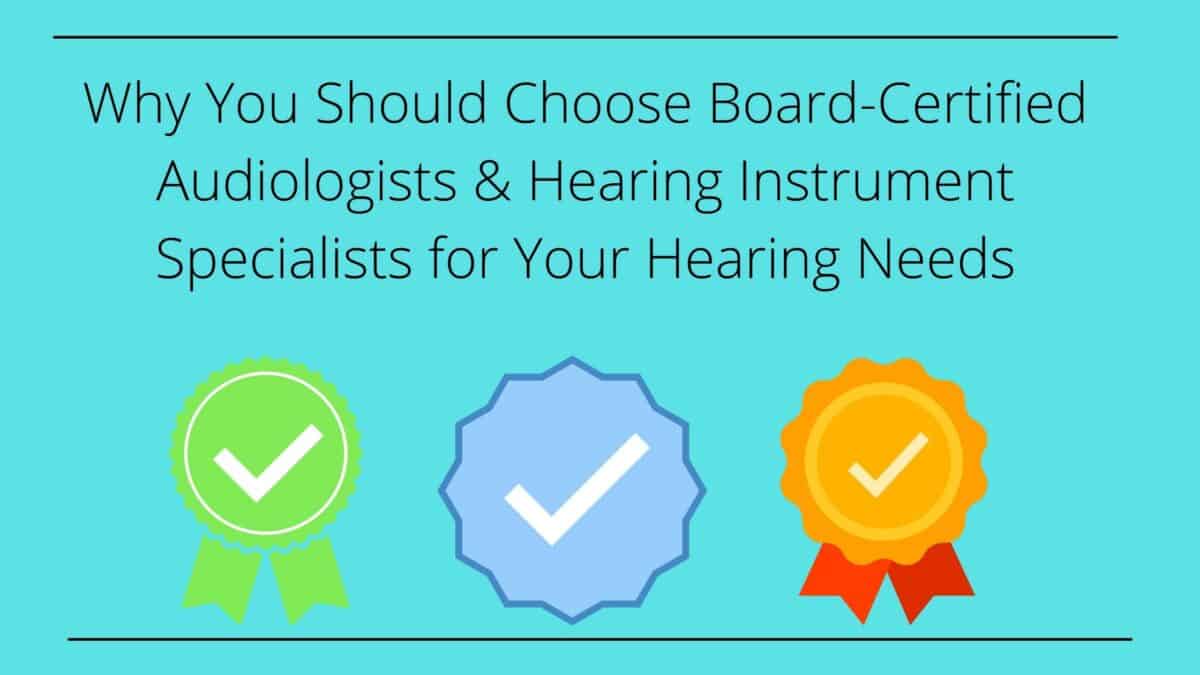Hearing aids are increasingly recognized as crucially important medical devices.
Once hearing loss becomes an issue, it can set off a cascade of negative outcomes for our health and well-being if it is not appropriately treated with hearing aids. Those with untreated hearing loss are at a significantly increased risk of depression, accidental injury, earlier onset of cognitive decline and dementia, and more.
Fortunately, by using hearing aids, these increased risks can be significantly reduced.
But how do you choose where to get your hearing aids?
There are plenty of places to get hearing aids these days, but audiologists are the only medically-trained specialists who can identify all the causes of hearing loss. And hearing instrument specialists can help you in the process of hearing aid selection to ensure that you acquire the most suitable device for your unique needs.
Board certification ensures that your hearing healthcare provider has demonstrated a number of important qualifications, giving them license to perform the following hearing health services.
What Do Hearing Instrument Specialists & Audiologists Do?
Select hearing aids
Each person’s hearing loss is different, and each person’s lifestyle is different. There are many types of hearing aids on the market, and not all of them are appropriate for everyone. By talking with you and getting to know you a little bit, we are able to understand what kinds of activities are important to you. This helps us advise you on the types of hearing aids that are likely to provide the best treatment for your hearing loss while interfering minimally in your daily routines.
Fit, program, dispense and maintain hearing aids
Board-certified audiologists and hearing instrument specialists are able to create custom earmolds for your hearing aids, if necessary, as well as program them to meet the requirements of your specific hearing loss. They are licensed to sell these hearing aids as well as to professionally clean and maintain them, as well as perform common repairs. (In some cases, hearing aids will need to be returned to the manufacturer for repairs.)
In choosing a board-certified hearing healthcare provider, you are ensuring that your initial hearing test is the start of a relationship that can go on for as long as you’re wearing your hearing aids. We will be there to help you whenever you have trouble and can update your programming, replace your earmolds, or do whatever else is required to make sure that you’re always hearing your best. We don’t simply sell you a set of hearing aids and send you off. We’re there whenever you need us!
Remove earwax
Before a hearing test, we examine your ears with an otoscope—the same device you’re familiar with from your general practitioner’s office when they look inside your ear canals. Audiologists—and hearing instrument specialists in some states—can clear away earwax buildup to ensure your ears are free and clear before administering a hearing test.
Select hearing aids
Each person’s hearing loss is different, and each person’s lifestyle is different. There are many types of hearing aids on the market, and not all of them are appropriate for everyone. By talking with you and getting to know you a little bit, we are able to understand what kinds of activities are important to you. This helps us advise you on the types of hearing aids that are likely to provide the best treatment for your hearing loss while interfering minimally in your daily routines.
Fit, program, dispense and maintain hearing aids
Board-certified audiologists and hearing instrument specialists are able to create custom earmolds for your hearing aids, if necessary, as well as program them to meet the requirements of your specific hearing loss. They are licensed to sell these hearing aids as well as to professionally clean and maintain them, as well as perform common repairs. (In some cases, hearing aids will need to be returned to the manufacturer for repairs.)
In choosing a board-certified hearing healthcare provider, you are ensuring that your initial hearing test is the start of a relationship that can go on for as long as you’re wearing your hearing aids. We will be there to help you whenever you have trouble and can update your programming, replace your earmolds, or do whatever else is required to make sure that you’re always hearing your best. We don’t simply sell you a set of hearing aids and send you off. We’re there whenever you need us!
Remove earwax
Before a hearing test, we examine your ears with an otoscope—the same device you’re familiar with from your general practitioner’s office when they look inside your ear canals. Audiologists—and hearing instrument specialists in some states—can clear away earwax buildup to ensure your ears are free and clear before administering a hearing test.
Audiologists and Hearing Instrument Specialists Under One Roof
At Hearing Solutions of North Carolina, we staff both audiologists and hearing instrument specialists. While hearing instrument specialists can administer hearing evaluations and take care of everything required to set you up with a set of hearing aids, it’s not always clear that hearing aids are what you need. Or, it may be that hearing aids are not the only thing you need to start hearing your best.
Some hearing issues are more complex. Audiologists frequently work alongside ENTs (ear, nose, and throat doctors) to discover the complex issues behind a hearing problem. Audiologists look at the whole auditory system, from the outer ear to the brain.
By having audiologists and hearing instrument specialists both available, we can be sure to provide the best service for every patient who comes in. We make sure that nothing is overlooked, so you can be guaranteed to get the treatment that is best for your specific hearing loss, whether or not hearing aids are a recommended part of that treatment. We’ll never sell you a set of hearing aids when there is another solution to your hearing problem!
If you or a loved one is having hearing issues, make an appointment for a hearing test today and start your journey toward better hearing!

